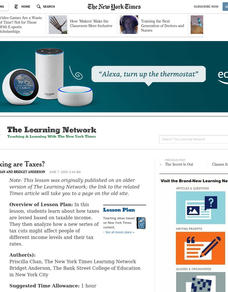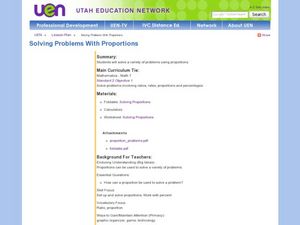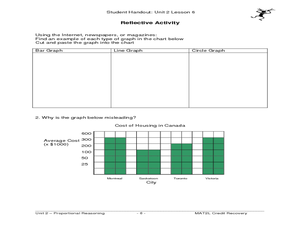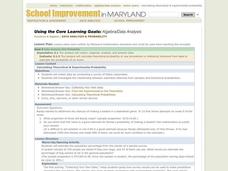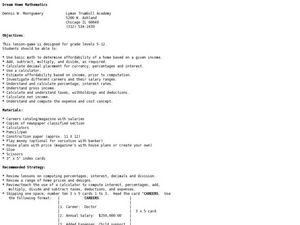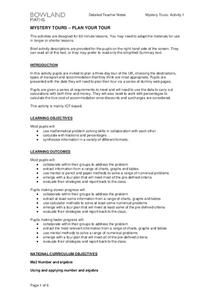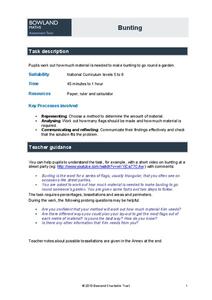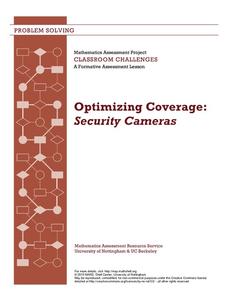Curated OER
Ratios
Students identify ratios to compare quantities and understand proportions. In this math lesson plan, students work in groups and use facts from the Holocaust to calculate ratios and percentages.
Curated OER
How Taxing are Taxes?
Students explore the ways that taxes are levied based on taxable income. They analyze how a new series of tax cuts might affect people of different income levels and their tax rates.
Curated OER
Working Watermelon
You're going to wish you had a watermelon for this lesson! Class members read about watermelons and make a salad in class to sample. They also perform estimates, measurements and calculations on a watermelon. They predict what percentage...
Curated OER
Solving Problems with Proportions
Seventh graders explore the concept of proportions. In this proportion lesson plan, 7th graders play a review game involving whiteboards. Students work in groups to solve a given proportion the fastest. Students also work in pairs to...
Curated OER
The Circle Graph
In this circle graph activity, students complete problems involving many circle graphs including a compass rose, degrees, and more. Students complete 7 activities.
Curated OER
Calculating Theoretical & Experimental Probability
Students explore the concept of experimental and theoretical probability. In this experimental and theoretical probability lesson, students collect data by conducting a survey of their classmates. Students compare their data and discuss...
Curated OER
Dream Home Mathematics
Explore the concept of budgeting with sixth graders. They will pick a career on note card made by the teacher. They then use the information on the card such as salary, expenses, and career to create a life for themselves. They also...
Bowland
Mystery Tours – Plan Your Tour
Everyone loves a vacation and a set of three activities has groups planning a tour of the U.K. using given distance, time, and price data. They solve a variety of problems related to the trip and produce a report on the success of...
Illustrative Mathematics
Anna in D.C.
The amount of tax and tip on a restaurant bill is a common example used in percent problems. Here, learners only know the total amount paid, and they need to figure the itemized amounts. Solutions using a ratio table, using knowledge of...
Curated OER
Unit Squares and Triangles
This is an interesting geometry problem. Given the figure, find the area of a triangle that is created by the intersecting lines. The solution requires one to use what he/she knows about coordinate geometry, as well as triangle...
Illustrative Mathematics
Area of a Trapezoid
Here is a straightforward example of how to apply the Pythagorean Theorem to find an unknown side-length of a trapezoid. Commentary gives additional information on proving that the inside of the trapezoid is a rectangle, but is...
Mathematics Assessment Project
T-Shirt Sale
Everyone loves a sale! As pupils investigate a sale on t-shirts, they determine the percent discount and original prices.
Bowland
Bunting
How much fabric is necessary for bunting? Scholars use given dimensions of triangular bunting (hanging decorations) to determine the amount of fabric necessary to decorate a rectangular garden. The task requires pupils to consider...
Bowland
German or English?
Sprechen sie Deutsch? Future cryptographers must decide whether an unknown text is written in English or in German. They use provided pie charts about the frequency of words in the English and German languages to help make their decisions.
Mascil Project
Circular Pave-Stones Backyard
Pack the lesson into your plans. Young mathematicians learn about packing and optimization with the context of circular paving stones. They use coins to model the paving stones, and then apply knowledge of circles and polygons to...
Curated OER
Fantasy Baseball
Check out this thematic unit, based on the game of baseball. Learners investigate numbers and number relations as they become familiar with some of the basic terminology associated with the game. They focus their attention on actual...
Statistics Education Web
Walk the Line
How confident are you? Explore the meaning of a confidence interval using class collected data. Learners analyze data and follow the steps to determine a 95 percent confidence interval. They then interpret the meaning of the confidence...
Curated OER
T Points from Directions
Here is a lesson plan that starts with having geometers translate points using compass directions into an accurate picture of the problem. Then they must use their knowledge of the Pythagorean theorem or similar triangles to solve. This...
Mathed Up!
Fractions of an Amount
After viewing a video on fractional amounts, young mathematicians put their new knowledge to the test. Throughout the assessment, class members find the fractional amount for prices, times, and populations. There are a few percent and...
Mathematics Assessment Project
Optimizing Coverage: Security Cameras
Are you being watched? Class members determine where to place security cameras protecting a shop. They then evaluate their own and several provided solutions.
West Contra Costa Unified School District
Interest and the Number e
Mary, Mary, quite continuously, how does your money grow? Uses examples to examine the difference between simple interest and compound interest, and to take a look at different rates of compounding. Learners explore what would...
Federal Reserve Bank
Lesson 3: A Fresh Start
The members of your economics class may be busy earning graduation credits, but the credit they should be concerned about is their financial credit. The third lesson plan in a unit about Hurricane Katrina and other events that can result...
Curated OER
All About Me: Measuring Height and Weight
Learners take personal fitness inventories. In this personal health lesson, students take measurements of their heights and weights. Learners record the data, calculate their BMI, and then chart their physical activity.
Curated OER
What's My Number?
Fifth graders use AppleWorks to stamp a given number to the thousandths place. They read, write and order integers, whole numbers and rational numbers. They represent place value using concrete or illustrated models.



